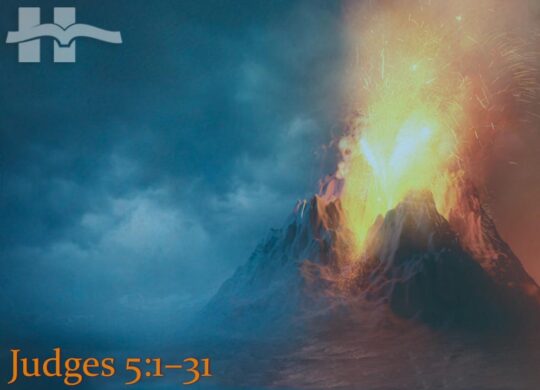Judges 5:1–31

Participation in the endeavors of God, as he fights for his people and empowers them, keeps one blessed.
The prose account of Barak’s victory in Judges 4 is completed only by the addition of 5:31b: the statement of the land’s rest. In that sense, the Song of Deborah in 5:1–31a is an interpolation of sorts, with a theological thrust of its own.
Right from the get-go, Yahweh is praised for Israel’s “leaders” and “people” enrolling to fight (5:2). Soon that praise transforms into a taunt of “kings” and “rulers,” ostensibly those of the foreign nations who dare to fight Yahweh and his people (5:3). So here, in 5:4–5, we have the Ruler of the universe setting forth for battle, moving northward to help his people, Israel, against Canaan—a cosmic event. This is a remarkably vibrant picture of Yahweh who, at the very outset, is taking the lead and marching out to battle the foes of his people. All of these reinforce Yahweh’s supremacy.
The portrayal of Yahweh in his dreadful majesty is immediately followed by the introduction of Deborah into those halcyon days before the battle (5:6–7). Thus the advent of Yahweh and that of Deborah are paralleled. Besides, when Yahweh “marches” in 5:4, in response Deborah (“my soul,” i.e., the singer of this Song) also “marches” in 5:21. Indeed, all individuals who are in sync with the endeavors of God and with the will of God manifest the power of God. If she could align herself to God’s purposes, as also did Israel’s “leaders,” “commanders,” “volunteers,” and “survivors” (5:2, 9, 13), then non-participants were not only negligent, but also culpable. A subtle jab at the subsequent non-participation of Israel is again seen, now in the mention of Shamgar, the son of Anath, and of Jael (5:6, 7)—both non-Israelites who accomplished great deliverances of the nation with unconventional weapons (3:31; 4:17–22).
To make a long story short, the unwillingness of certain tribes to participate in this war against the enemy comes in for strong disapprobation in the Song of Deborah. The unfortunate “rest of the story” is that many of “Israel” were non-participants in this battle. Indeed, it would be a non-Israelite, non-warrior, non-male, wielding a non-weapon, who would perform the decisive action that would clinch the victory for Israel against Canaan!
While the prose account lists only two tribes (Zebulun and Naphtali; 4:6, 10), the poetic depiction in 5:14–17 has a roll call of several more, divided into participants and non-participants. One sees that 5:14–24 a carefully constructed section at the center of which is a human-divine synergistic defeat of Israel’s foes (5:18–22), flanked by a list of non-participants (5:15b–17, 23), and bounded on the outside by participants (5:14–15a, 24). Thus a large chunk of the Song of Deborah highlights those tribes participating in the battle (positively portrayed) and a woman, Jael (also positively portrayed), as well as the non-participating tribes (negatively portrayed) and Sisera’s womenfolk (also negatively portrayed).
Notice that the whole universe appears to be taking part in the campaign against Yahweh’s enemies (earth and heaven, 5:20–21; also 5:4) to deliver a stunning defeat (5:22). If the entire universe took the side of Yahweh in this campaign, how unbecoming of some humans to have remained uninvolved, as non-participants! They were surely without excuse.
The poetic conclusion in 5:31a pronounces a death wish upon the non-participants, and a prosperity wish upon the participants—an appropriate summary for a hymn that has contrasted these two camps. Thus it remains an ongoing warning for those who call themselves the people of God but neglect to join in the endeavors of God, for God and his glory, with heart and soul and voice.
[For more details, see my Judges commentary.]












 Abe Kuruvilla is the Carl E. Bates Professor of Christian Preaching at The Southern Baptist Theological Seminary (Louisville, KY), and a dermatologist in private practice. His passion is to explore, explain, and exemplify preaching.
Abe Kuruvilla is the Carl E. Bates Professor of Christian Preaching at The Southern Baptist Theological Seminary (Louisville, KY), and a dermatologist in private practice. His passion is to explore, explain, and exemplify preaching.